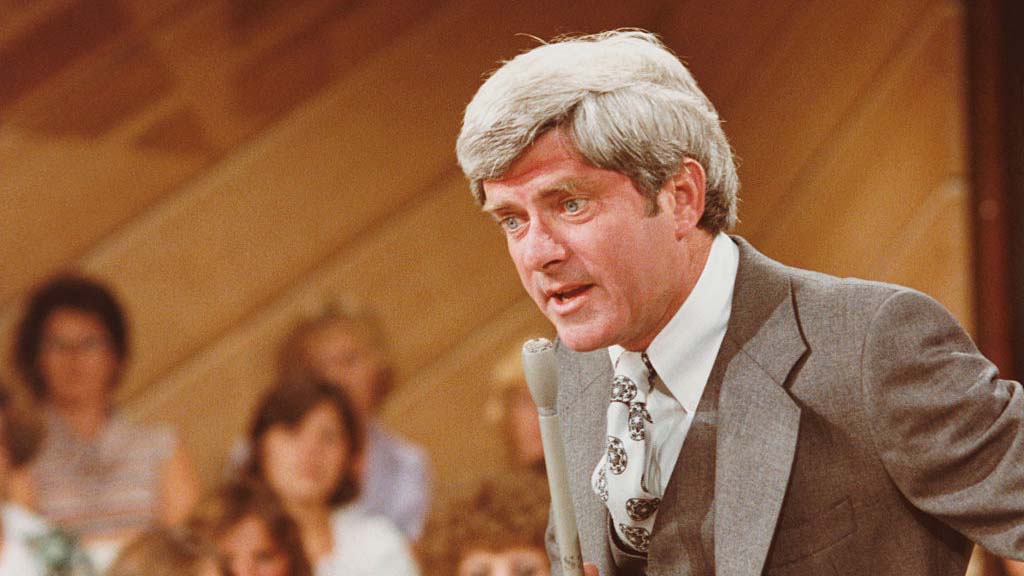Talk-Show Host Phil Donahue Dies at 88
Phil Donahue presided over influential daytime talker from 1969-1996

The smarter way to stay on top of broadcasting and cable industry. Sign up below
You are now subscribed
Your newsletter sign-up was successful
Phil Donahue, talk-show host and broadcast journalist, died Sunday night at age 88 after a long illness, his family confirmed to NBC’s Today.
Donahue presided over The Phil Donahue Show, later renamed Donahue, from 1969 to 1996 – nearly three decades – and inspired others in its wake, including Oprah Winfrey. Over the course of its run, Donahue won nine Daytime Emmys and earned 21 nominations. He also won a Primetime Emmy for a special, Donahue and Kids. He received a Peabody Award in 1981.
According to Variety, Donahue was born in Cleveland on December 21, 1935. He graduated from Notre Dame and during his time at the university, he worked at its local station, WNDU, where he caught the broadcasting bug. After graduating, he started as a replacement announcer at Cleveland’s KYW-AM TV. He moved around a bit, working for radio station WABJ in Michigan and then WHIO-AM-TV in Dayton, Ohio, where he started interviewing people, including Jimmy Hoffa. At WHIO, he hosted a daily 90-minute talk show called “Conversation Piece,” starting in 1963. He did that for four years and then frustrated with his inability to breakthrough nationally, he quit broadcasting and got a job as a salesman at a trading stamp company in Dayton.
That didn’t last long, however, and within months, he was back on the air, this time at WLWD-TV in Dayton with the first iteration of what would become his signature show. Because the show had a hard time luring prominent guests to Ohio, it stuck with one interview per show and sent Donahue into the audience. While those two factors were born of necessity, they became what made Donahue unique on television.
The Phil Donahue Show was picked up to national syndication in 1969, distributed by the Avco Broadcasting Company. By 1971, it was airing on 44 stations. In 1974, it moved to WGN Chicago and was renamed Donahue.
Multimedia Program Productions bought the show in 1976 and by the end of the decade, it was airing on more than 200 stations across the country. He also began picking up other gigs, including appearing on NBC’s The Today Show from 1979-88 and on ABC’s late-night program, The Last Word, in 1983. In 1985, the show moved to New York and began airing live. From 1991-94, he also partnered with Soviet Vladimir Pozner for a show on CNBC called Pozner/Donahue that ran from 1991-94. In 1992, he moderated a primary debate between then Democratic presidential nominee Bill Clinton and former California governor Jerry Brown.
Donahue ended its run in 1996 after other talk shows, and especially The Oprah Winfrey Show, began to dominate and pull crucial female viewers away.
The smarter way to stay on top of broadcasting and cable industry. Sign up below
He returned to TV in 2002-03 with an eponymous talk show on MSNBC that lasted six months.
In 2007, he worked with Ellen Spiro to write, direct and produce a documentary feature on the Iraq War called Body of War. He continued appearing on TV through 2014.
Donahue was inducted into the Academy of Television Arts & Sciences’ Hall of Fame in 1993 and won an ATAS lifetime achievement award in 1996. President Joe Biden awarded him the Presidential Medal of Freedom in May. He is survived by his second wife, Marlo Thomas, 86, whom he married in 1980, as well as five children from his first marriage.
Donahue’s family is requesting that in lieu of flowers, donations be made to St. Jude Children’s Research Hospital, a longstanding charitable interest of Thomas, or to the Phil Donahue/Notre Dame Scholarship.
Contributing editor Paige Albiniak has been covering the business of television for more than 25 years. She is a longtime contributor to Next TV, Broadcasting + Cable and Multichannel News. She concurrently serves as editorial director for The Global Entertainment Marketing Academy of Arts & Sciences (G.E.M.A.). She has written for such publications as TVNewsCheck, The New York Post, Variety, CBS Watch and more. Albiniak was B+C’s Los Angeles bureau chief from September 2002 to 2004, and an associate editor covering Congress and lobbying for the magazine in Washington, D.C., from January 1997 - September 2002.

